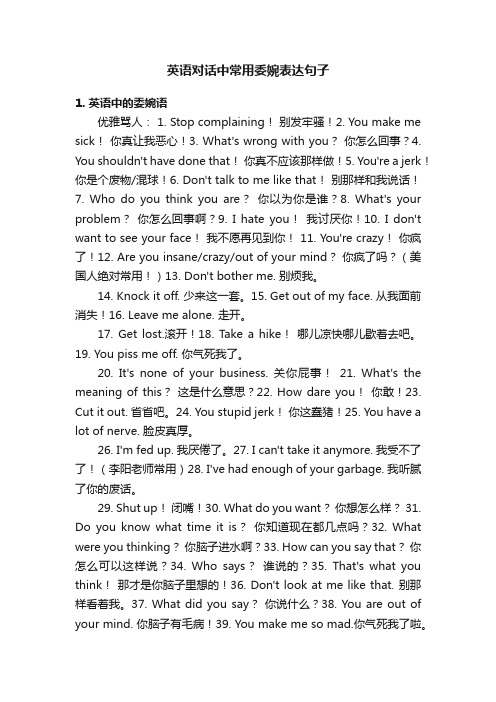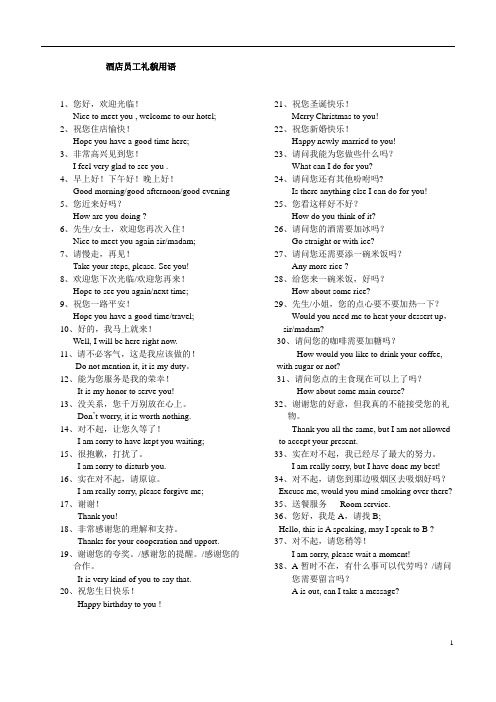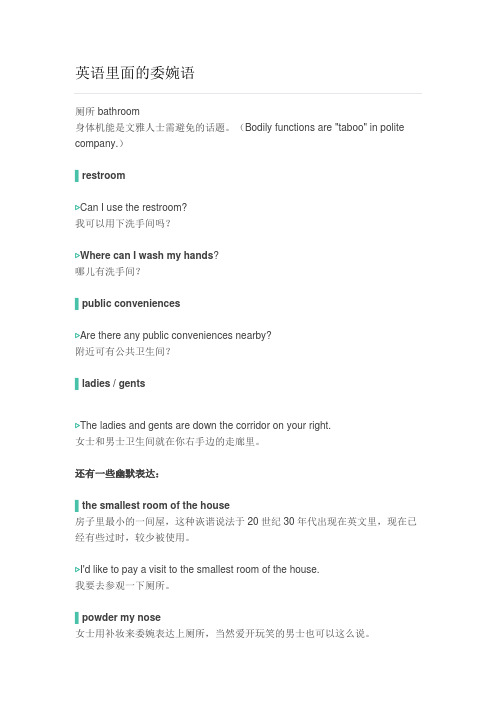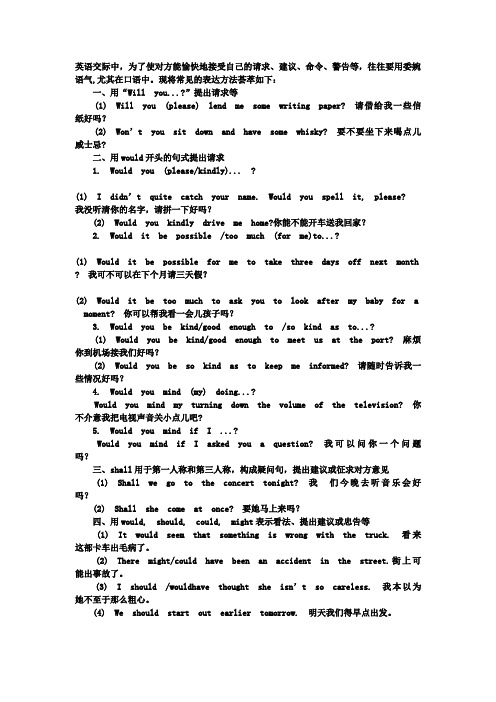中英文委婉语Word版
英语对话中常用委婉表达句子

英语对话中常用委婉表达句子1. 英语中的委婉语优雅骂人: 1. Stop complaining!别发牢骚!2. You make me sick!你真让我恶心!3. What's wrong with you?你怎么回事?4. You shouldn't have done that!你真不应该那样做!5. You're a jerk!你是个废物/混球!6. Don't talk to me like that!别那样和我说话!7. Who do you think you are?你以为你是谁?8. What's your problem?你怎么回事啊?9. I hate you!我讨厌你!10. I don't want to see your face!我不愿再见到你! 11. You're crazy!你疯了!12. Are you insane/crazy/out of your mind?你疯了吗?(美国人绝对常用!)13. Don't bother me. 别烦我。
14. Knock it off. 少来这一套。
15. Get out of my face. 从我面前消失!16. Leave me alone. 走开。
17. Get lost.滚开!18. Take a hike!哪儿凉快哪儿歇着去吧。
19. You piss me off. 你气死我了。
20. It's none of your business. 关你屁事!21. What's the meaning of this?这是什么意思?22. How dare you!你敢!23. Cut it out. 省省吧。
24. You stupid jerk!你这蠢猪!25. You have a lot of nerve. 脸皮真厚。
26. I'm fed up. 我厌倦了。
礼貌用语65句(中英对照版)

酒店员工礼貌用语1、您好,欢迎光临!Nice to meet you , welcome to our hotel;2、祝您住店愉快!Hope you have a good time here;3、非常高兴见到您!I feel very glad to see you .4、早上好!下午好!晚上好!Good morning/good afternoon/good evening 5、您近来好吗?How are you doing ?6、先生/女士,欢迎您再次入住!Nice to meet you again sir/madam;7、请慢走,再见!Take your steps, please. See you!8、欢迎您下次光临/欢迎您再来!Hope to see you again/next time;9、祝您一路平安!Hope you have a good time/travel;10、好的,我马上就来!Well, I will be here right now.11、请不必客气,这是我应该做的!Do not mention it, it is my duty。
12、能为您服务是我的荣幸!It is my honor to serve you!13、没关系,您千万别放在心上。
Don’t worry, it is worth nothing.14、对不起,让您久等了!I am sorry to have kept you waiting;15、很抱歉,打扰了。
I am sorry to disturb you.16、实在对不起,请原谅。
I am really sorry, please forgive me;17、谢谢!Thank you!18、非常感谢您的理解和支持。
Thanks for your cooperation and upport. 19、谢谢您的夸奖。
/感谢您的提醒。
/感谢您的合作。
英语里面的委婉语

厕所 bathroom身体机能是文雅人士需避免的话题。
(Bodily functions are "taboo" in polite company.)▌restroom▷Can I use the restroom?我可以用下洗手间吗?▷Where can I wash my hands?哪儿有洗手间?▌public conveniences▷Are there any public conveniences nearby?附近可有公共卫生间?▌ladies / gents▷The ladies and gents are down the corridor on your right.女士和男士卫生间就在你右手边的走廊里。
还有一些幽默表达:▌the smallest room of the house房子里最小的一间屋,这种诙谐说法于20世纪30年代出现在英文里,现在已经有些过时,较少被使用。
▷I'd like to pay a visit to the smallest room of the house.我要去参观一下厕所。
▌powder my nose女士用补妆来委婉表达上厕所,当然爱开玩笑的男士也可以这么说。
▷Where can I powder my nose?我上哪儿能补个粉?▌see a man about a dog这种说法原始意思是指为赛马或者赛狗下注,后来通常作为离开或缺席的借口。
原因通常是去上厕所,或者买酒。
▷He's gone to see a man about a dog.他去方便了。
失业unemployment▌between jobs在前一个和后一个工作之间,也就是待业啦。
▷Interviewer: Tell me about your current position.面试官:请告诉我你目前的职位。
▷Job candidate: I'm between jobs right now.求职者:我目前暂时待业。
中英委婉语及其翻译方法

中英委婉语及其翻译方法On Chinese and English Euphemisms andTheir T ranslationI IntroductionThe word “euphemism”originates from Greek, “eu ”serves as prefix, with the meaning of “good, sounding good”, while the root “pheme” means “saying; speech”. So the whole word suggests “to speak with good words or in a pleasant manner”. According to Newman (1990.1), euphemism can be explained as “substituting an inoffensive or pleasant term for a more explicit, offensive one, thereby veneering the truth by using kind words”. For example, when talking about death, people would like to use “pass away, be no more; come to an end” rather than the blunt “death”. Based on this explanation, it will be not difficult for us to form the basic impression that euphemisms can avoid unpleasant word and create relatively positive atmosphere and glorifying sense.However, the reasonable use of euphemism is not an easy job. One has to understand something before using it correctly. And the euphemism device is more a cultural and psychological reflection in language than a more language use .In cultural field, the religion factor, legend factor, literature factor, custom factor and historical stories can all affect the precise understanding and using of euphemisms.Moreover, culture, as we all know, has its particular national features. That is to say, different countries have different culture tradition and heritage. And as language is the carrier of a nation’s culture, all the distinction in culture are reflected in thelanguage level. As the use of it has to be performed under the cultural instruction and consideration.At present, euphemism use, as one of the commonest phenomena in human language, has been deeply embedded in the language use. In the daily life and work, euphemism can lubricate and coordinate the interrelation among person to make the communication go on more smoothly. So it will not be exaggerated to emphasize euphemisms’import ance. Instead, as the improvement of social civilization, more and more euphemisms use will be adopted in language production. What’s more, the chance of communication between Chinese and foreigners is more frequent, during this process, it is quite important to know about the respective communication habits and cultural tradition in order to avoid unnecessary misunderstanding in both sides. So the authorwould like to say, it is of great value and practical instruction in cross-cultural communication to study this interesting language method-euphemism in terms of cultural intention between Chinese and English.II The Same Cultural Psychology of Euphemism Use in Chinese and English LanguageAlthough euphemism have an early origination, they hadn’t begun to appear in a wide range at a swift space until the modern times when the technology and productivity were improving constantly and the whole society and human kind were in a processing state. Just during this processing much taboo in social, psychological and language aspect has turned up constantly, which provided a good precondition for the booming of euphemism. Here, the article will further analyze the commoncultural elements in the use of euphemisms in Chinese and English from three different angles.2.1 Language T abooEither in highly civilized society or in the primitive tribes, there exist euphemisms. Either in widely used languages or in the languages of ethnic groups, there exist euphemisms. The earliest field of their uses is the addresses to the God or the ghost. Because at the early times, people’s knowledge about nature and science is lacking badly, then they had to own many mystic things to the influence of ghost or God. And they were so worshipping and horrified to this kind of super power that they began slowly to avoid mentioning then frankly and directly. Then taboo became the earliest euphemism.For example, in English-speaking countries, they are so devoted to the God that they use many other names for Jehovah, such as the Almighty, the Supreme being, Holy one the Eternal, the Maker, the Savior and the lord of lords and so on. In Chinese there are also many euphemisms due to taboo. Take the expression of death for example, the Chinese euphemisms for it includes:离去,不在了,走了,仙逝,骑鹤,涅磐,去西天,蝉蜕,崩,弃世,不戮,and so on.Of course there are many other fields where taboo is actively stimulating the use of various euphemisms. Generally speaking, both in Chinese and English, euphemisms in disease, sex, excretion, unemployment, poverty and old age are the most usual occasions to see them. Any language user should pay careful attention to the taboo culture, both home and abroad, either same or different or else, others may be badly offended while you still feel quite innocent. So it is better for language users to avoidunhappiness and go on more joyful conversation.2.2The Common Aesthetical ConceptAesthetical concept is a potential consciousness university owed by all the person in the society. Culturally speaking, it is cultivated gradually together with cult ure in people’s mind and in the wide environment of the whole society. So as long as one exists as a person in a social context, literate or illiterate, he is sure to hold some kind of most preliminary cultural concept in aesthetics.Due to communal aesthetics in the whole word, any kind of languages, Chinese or English, there must be similar euphemisms in such fields as birth, death, disease, sex, crime, professions, politics and so on. Especially on public occasions, words in terms of those fields are usually avoided to express in a frankly speaking way but in a veneering and encoring way, in order to lessen unpleasant factors and add joyful elements. Therefore, graceful and mild terms often appear in this content. Let’s read the following two groups of sentences.(a)He got venereal disease.他得过性病。
英语语言文化中的委婉语

英语语言文化中的委婉语
1. Could you possibly... (可能你能...)
2. Would you mind... (你介意...)
3. I was wondering if... (我想知道是否...)
4. Perhaps we could consider... (也许我们可以考虑...)
5. It might be better if... (如果...可能会更好)
6. If it's not too much trouble... (如果不太麻烦的话)
7. I'm sorry, but I'm afraid I can't... (对不起,但恐怕我不能...)
8. I don't want to be a bother, but... (我不想麻烦你,但...)
9. I hope you don't mind if... (希望你不介意如果...)
10. It would be appreciated if... (如果...会受到感激)
11. I'm sorry to trouble you, but... (很抱歉麻烦你,但...)
12. If it's not too much to ask... (如果不过分的话...)
13. I was wondering whether you could... (我在想你是否能...)
14. Excuse me, but would it be possible to... (请问可否...)
15. I would be grateful if... (如果...我会感激不尽)。
2021年英语礼仪之说话要委婉

英语礼仪之说话要委婉如果当我们碰到一些残疾人,我们在说话的时候就要委婉一些,要理解他人的.感受,应届毕业生职场英语网站为大家了一些这种情景下的委婉用语,供大家参考!成浩在北京的ABC美国公司工作,下班后跟美国同事Ak一起往外走。
(Office ambience)CH:Hi Ak. 碰上你太好了!A: I haven't seen you all day. Is there something on your mind?CH: 你还记得不久前,我们那儿来了个坐轮椅的新同事吗?A: Yes, and we talked about your being unfortable around her because you weren't sure what to do.CH: 现在好多了,我们已经成了好朋友。
要是我什么地方做得不得体,她会直截了当地告诉我。
A: What do you mean?CH: 比如说那天,我们一起聊天,她就很客气地告诉我,不应该把她的轮椅当家具,倚在上面。
A: It soun ds as if you are handling this issue well.CH: 可是,有时候遇到其它handicapped的人,我还是有点儿不知所措。
A: First of all, you shouldn't refer to those people as handicapped. That is something of an old-fashioned term that is demeaning to many.CH: 不说handicapped残疾人,那要怎么说呢?A: Refer to these employees as having a disability. It shows more respect.CH: 这么说是不是太笼统了?别人会问,是什么样的残疾。
英汉委婉语

2.有关“低微职业”的委婉语。 2.有关“低微职业”的委婉语。 有关 随着社会的不断进步和飞速发展, 随着社会的不断进步和飞速发展,现代化的程度和文 明水平也在不断提高。为提高某些职业的社会地位, 明水平也在不断提高。为提高某些职业的社会地位,人们往 往使用委婉语来加以美化。 往使用委婉语来加以美化。在汉语和英语中都有大量关于职 业名称的委婉语,这类委婉语通过夸张、夸大,使其显得比 业名称的委婉语,这类委婉语通过夸张、夸大, 它们所代表的真实事物更体面、更重要。 它们所代表的真实事物更体面、更重要。这种现象在现代英 语中比比皆是: maid(女仆) housekeeper(女管家) 语中比比皆是:把maid(女仆)或housekeeper(女管家) 称为domestic help(家务助手)、day- help(白天帮工) )、day 称为domestic help(家务助手)、day- help(白天帮工) livehelp(住家帮手); );一般服务员也升级为 或live- in help(住家帮手);一般服务员也升级为 service manager(服务管理人员);butcher(屠夫)也改 manager(服务管理人员);butcher(屠夫) );butcher 称为meat technologist(肉类技术专家); );garbage 称为meat technologist(肉类技术专家);garbage collector(垃圾收集工)也成sanitation engineer( collector(垃圾收集工)也成sanitation engineer(环境 卫生工程师)。 卫生工程师)。
英汉委婉语的定义
委婉语的使用是世界各种语言的一种共有的现象,汉语称为“ 委婉语的使用是世界各种语言的一种共有的现象,汉语称为“委婉 即用好听的,含混的,兜圈子的,令人愉快的, 语”。即用好听的,含混的,兜圈子的,令人愉快的,不得罪人的说 法替代生硬的,粗俗的,不便直说的,令人不愉快的说法。而在《 法替代生硬的,粗俗的,不便直说的,令人不愉快的说法。而在《牛 津简明英语词典》 津简明英语词典》中对euphemism一词的定义是“substitution of
英语委婉语气表达法

英语交际中,为了使对方能愉快地接受自己的请求、建议、命令、警告等,往往要用委婉语气,尤其在口语中。
现将常见的表达方法荟萃如下:一、用“Will you...?”提出请求等(1) Will you (please) lend me some writing paper? 请借给我一些信纸好吗?(2) Won’t you sit down and have some whisky? 要不要坐下来喝点儿威士忌?二、用would开头的句式提出请求1. Would you (please/kindly)... ?(1) I didn’t quite catch your name. Would you spell it, please?我没听清你的名字,请拼一下好吗?(2) Would you kindly drive me home?你能不能开车送我回家?2. Would it be possible /too much (for me)to...?(1) Would it be possible for me to take three days off next month ? 我可不可以在下个月请三天假?(2) Would it be too much to ask you to look after my baby for a moment? 你可以帮我看一会儿孩子吗?3. Would you be kind/good enough to /so kind as to...?(1) Would you be kind/good enough to meet us at the port? 麻烦你到机场接我们好吗?(2) Would you be so kind as to keep me informed? 请随时告诉我一些情况好吗?4. Would you mind (my) doing...?Would you mind my turning down the volume of the television? 你不介意我把电视声音关小点儿吧?5. Would you mind if I ...?Would you mind if I asked you a question? 我可以问你一个问题吗?三、shall用于第一人称和第三人称,构成疑问句,提出建议或征求对方意见(1) Shall we go to the concert tonight? 我们今晚去听音乐会好吗?(2) Shall she come at once? 要她马上来吗?四、用would, should, could, might表示看法、提出建议或忠告等(1) It would seem that something is wrong with the truck. 看来这部卡车出毛病了。
- 1、下载文档前请自行甄别文档内容的完整性,平台不提供额外的编辑、内容补充、找答案等附加服务。
- 2、"仅部分预览"的文档,不可在线预览部分如存在完整性等问题,可反馈申请退款(可完整预览的文档不适用该条件!)。
- 3、如文档侵犯您的权益,请联系客服反馈,我们会尽快为您处理(人工客服工作时间:9:00-18:30)。
Death(死亡)1.to be asleep in the Arms of God (本义)安睡在上帝的怀中2.to be at peace (本义)平静了3.to be at rest (本义)在休息4.to be called to God (本义)被召唤到上帝那5.to be called home (本义)被召回家6.to be home and free (本义)到家自由了7.to be taken to paradise (本义)被送进天堂8.The call of God (本义)上帝的召唤9.to depart (本义)离去10.The final departure (本义)最后离去11.final sleep (本义)最后一觉12.to go home (本义)回家13.to go to heaven (本义)进天堂14.to go to one's long home (本义)回到永久之家15.to go to one's own place (本义)回老家16.happy land (本义)乐土17.to have fallen asleep (本义)入睡了18.to have found rest (本义)得到安息19.to have gone to a better place(land,world,life)到一个更好得地方20.in heaven (本义)在天堂21.to join one's ancestors (本义)加入先人的行列22.join the Great majority (本义)加入大多数23.to leave this world (本义)离开今世24.to pay one's fee (本义)付费25.to rest (本义)休息26.to rest in peace (本义)安息27.to return to dust (本义)归之尘土28.to sleep (本义)长眠29.with God (本义)和上帝在一起30.with their Father (本义)与圣父在一起31.to fall (本义)倒下了32.to do one's bit (本义)尽职了33.to lay down one's life (本义)放下自己的生命34.to be no longer with us (本义)不再与我们在一起了35.to be out of pain (本义)摆脱痛苦36.to breathe one's last (本义)呼了最后一口气37.to cancel one's account (本义)销帐38.pay one's last debt (本义)付最后一笔债39.kick the bucket 翘辫子40.pop off (the hooks) 翘辫子41.get off the hooks 脱身了42.to fade away (本义)消失43.to make one's exit (本义)退场44.to kick off (本义)开球45.to be free (本义)解脱了46.to be gone (本义)去了47.to be no more (本义)不复存在48.to close one's eyes (本义)瞑目49.to come to an end (本义)结束50.to go beyond (本义)到远方去51.to expire (本义)呼气52.to go off (本义)离去53.to go one's last (本义)走到自己的终点54.to go one's place (本义)回老家55.to go to one's resting place (本义)到休息地去56.to go to west (本义)西去57.to kick the bucket (本义)踢翻水桶58.to lose one's life (本义)失去了生命59.to pass away (本义)离去60.to stop living (本义)停止生存61.to take one's rest (本义)休息62.to shut up the shop (本义)关门Sex 性1.sleep 睡觉,上床2.love, make love 做爱3.lover 有肉体关系的爱人4.experience lover 有性经历的人5.treat off a piece of shirt /treat off a hung of shirt 睡了某人6.go all the way 允许做一切7.He did her wrong. 他做了对不起她的事。
8.Do 做爱9.Did you do her? 你做了吗?10. Fix sb. up 给某人找约会对象,睡觉对象11.to make love/ to have sex with/ to go to bed with/ be in bed 与某人发生关系12.art of pleasure , union intimacy(亲昵)13.free love 自由性爱14.trial marriage 试婚15.mixed singles 未婚同居16.love companion 性伴侣她怀孕了。
17.She has cancelled all her social engagement.18.She is in an interesting condition.19.She is in a delicate condition.20.She is knitting bootees.21.She is in the family way.22.She is expecting.23.She is in a.她快要当家了。
24.She is knocked up.她有了。
25.A hole out in one (本义) 一击入洞26.An accident (本义) 事故27.Awkward (本义) 行动不便的28.To be caught (本义) 被捉住29.to be gone(本义)已过去了30.to beget(本义)产生31.break one's ankle(本义)脚骨折了32.clucky(本义)抱窝的33.eating for two(本义)吃双份饭34.full of heir(本义)怀有继承人35.fragrant(本义)香喷喷的36.full of heir(本义)怀有继承人37.to have a hump in the front(本义)前身有块隆肉38.to have one watermelon on the vine(本义)藤上有瓜了39.to have one on the way (本义)有人要来40.in a bad shape(本义)身体不佳41.in a certain condition(本义)身处某种状态42.in a delicate condition(本义)身体虚弱43.in a (the) family way(本义)家常打扮44.in a familiar way(本义)熟悉地45.in a particular condition(本义)处于特殊状态46.in an interesting condition(situation, state)(本义)处于有趣状态47.in trouble(本义)惹上麻烦48.irregularity(本义)不规则现象49.knitting(本义)绒衣50.to knock up(本义)敲门叫人dy-in-waiting(本义)有所期待的女子52.to learn all about diaper folding(本义)学叠尿布53.a mother-to-be(本义)未来的母亲54.on the nest(本义)在抱窝55.preparing the bassinet(本义)准备摇篮56.rattle shopping(本义)采购玩具57.rehearing lullabies(本义)练唱催眠曲58.to spoil a woman's shape(本义)坏了女子体型59.to sprain an ankle(本义)扭伤脚踝60.to swallow a watermelon seed(本义)吞了棵西瓜子61.that way(本义)那样62.waiting for the patter of little feet(本义)等待小脚丫声63.to wear the apron high(本义)围裙系高64.an waiting woman(本义)等待中的妇女65.with a baby window(本义)有个凸窗肚66.with child(本义)怀孩子了67.未婚先育She is in trouble.她碰到麻烦。
She has been unwise.她不够明智。
She has been too friendly.她过于友善。
Poverty and unemployment 贫穷与失业1.give the sack to sb. 解雇某人2.staff redundant 人员过剩(有些老板借口员工太多而裁员,如果他在某个员工面前提及人员过剩, 该员工即面临着失业。
)y off 待岗4.give the walking ticket发站票(指代失业的状态)5.involuntarily leisured闲置(指代失业的状态)6.pink slip 领粉色支票(指代失业的状态)7.dismiss解雇→lay off / ease out / give sb. the walking ticket 停止雇用/免职/把解雇书给某人8.welfare-mother福利母亲(指失去工作的母亲,因为她们靠社会福利生活。
)9.between jobs/between shows 待业中10.to be developing new project/to receive a Mexican raise/to receivean Irish promotion 接受失业救济11. a member of the lower-social-economical bracket社会经济低层分子(指一个人很穷)12.hard up拮据(指身无分文)13.in difficulties处于困境(指债务缠身)14.in embarrassing obligation 身负尴尬义务(指债务缠身)。
